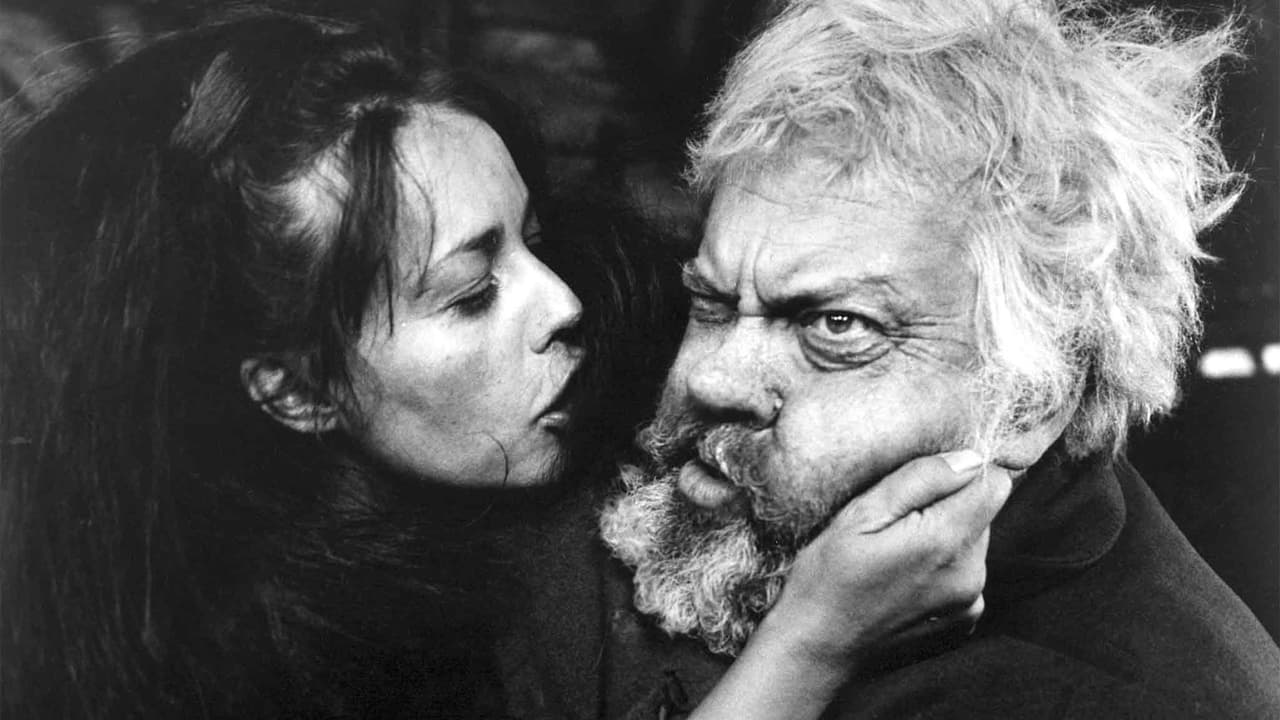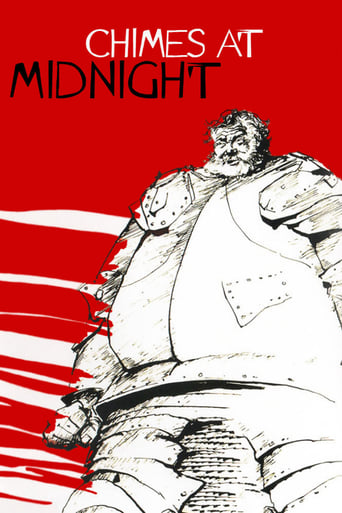



Overrated
The story, direction, characters, and writing/dialogue is akin to taking a tranquilizer shot to the neck, but everything else was so well done.
View MoreIt's a good bad... and worth a popcorn matinée. While it's easy to lament what could have been...
View MoreAll of these films share one commonality, that being a kind of emotional center that humanizes a cast of monsters.
View MoreOrson Welles appears in this film larger than ever (ironically, according to the IMDb trivia, he had to slim down to play the role - perhaps there was extra padding, one can only assume). He has the build of a boulder, and the face of the character Hagrid from Harry Potter aged in his 70's. Welles was in his late 40's, turning 50, by the time he took on the role of Sir John "Jack" Falstaff, the man who held his own court and council during the years of Henry the IV, but was sort of an outsider. He was a fool, a liar, a sweet guy who could get the attention of men and woman far and wide - from stutterers to the likes of women played by Jeanne Moreau - and yet he was never really 'apart' of the kingdom, that stuffy place where Henry (as played by a platitudinal John Gielgud) is in ill-health from the beginning of this story - even as he, along with his son the Prince Hal (later Henry the Fifth) - controlled the kingdom from outside invading influences.I saw the film with someone who didn't really get what many of the characters want or any dimensions to them (outside of Falstaff, who is a force of nature). I can understand it. It's hard to get a handle at times on this story or even some of these characters; some of that, frankly, we can put on the Shakespeare dialog, which is beautiful and beguiling and deep and existential and poetic and, in 21st century times, slippery almost. But for me, the emotional component was always there, and Welles was a Mega-Master of Shakespeare even back in the 1930's (re his productions of Macbeth, Julius Caesar, even the rough draft of this film, Five Kings). So by the time he got to this, rough-hewed as it is, Chimes at Midnight is like his Final Dissertation as a master filmmaker.Can I just take a moment out to talk how great Welles is here? He commands every second on screen. It can be said he hams it up. Can you blame him really, if it falls into that? I read more depth though in nearly every scene; even in those where Jack Falstaff hears people mock him, he takes it in stride, and can give it as good, or better, than he takes. His tongue is so sharp, and his reactions so BIG, that it's easy to read this as campy. But it's a deeply felt performance, with Welles swallowing this character into his solar plexus. He never plays Falstaff as being as regal as, say, Henry IV, or as Hotspur Percy, who is like many a Game of Thrones character (to put it in modern parlance) who just wants that friggin crown and wants it all his own.I think the characters know what they want, or are trying to figure it out far as it goes. If there can be a legitimate criticism it's that Baxter, as Hal/young Henry V, is kind of the weak link among the cast. Albeit this is a cast with Welles, Moreau, Gielgud, Fernando Rey in a small but commanding role as another warrior. But he takes up a lot of screen time, and is best when having to do fierce reaction or passive poise - enjoying the company of Falstaff he's fine but but totally convincing. No matter - when someone like Welles or someone like Gielgud or Rodway as Percy or Rutherford as the Mistress mining the place Falstaff calls his court... it makes the journey much more entertaining. When you have a Shakespeare adaptation, especially one as ambitious and wild as this one, you got to have a cast that can pull out the emotional connections. They're here.And if Welles really pulls out all the stops with his acting - it may even be his dare I say most towering, monolithic work as an actor, with the range going from bawdy comedy and sweet kindness to shattered tragic tones and bewilderment and shock, everything is there - the filmmaking reaches up to it. There is a battle sequence midway through the film as Henry's troops fight oncoming invaders. My God. Just... if you can get a copy of the film, if nothing else that sequence holds up as one of the two or three essential battles on film. There's chaos, there's fast cutting (yet, even with Welles, you always can see what's going on, far as it goes), and yet there's a story going on as Falstaff, who is on the sidelines of the action, tries not to get involved and even plays dead, and Welles is really crafty in cutting back to this. He apparently only had 100 men at a time to work with. He makes it look like triple that - and all the mud and blood that goes with the dirtiness of an epic battle.It's a filmmaker who loves Shakespeare so deeply, yet he connects it with his own life as an artist and doesn't lose that. It may not matter to some, but I liked that this could be a metaphor for not just Welles but anyone on the margins looking in, unable to break through (especially at the end, as Henry V finally reaches the throne). The energy and force of the direction, the acting, the writing, it triumphs over technical flaws - the syncing of dialog in parts, the fact that parts just connect enough, as it did with Othello in the filmmaking - and in a couple of the performances in spurts. It ranks with the major Welles films, and I do hope it gets to DVD soon (I lucked out with a Welles retrospective that kind of had to play it to be complete) so I can revisit it; I have a feeling, with time, it'll deepen like Kane with appreciation for the craft and ideas on display.
View MoreLocarno 2005 ran a complete Orson Welles retrospective including all of his masterpieces and some lesser known works that are less than masterpieces. The Orson Welles highlight of day seven was his very rarely shown "Falstaff --Chimes at Midnight", 1965, which Welles always claimed as his personal favorite. Loosely adapted from several Shakespeare plays in which the boisterous character of John Falstaff appears. Welles himself plays the ribald central character at a very portly age of fifty and is ably supported by a mainly English cast, notably John Gielgud as the king. French nouvelle Vague actresses Marina Vlady and Jeanne Moreau have cameos. Moreau, it is said, worked for almost nothing just to be directed by a living legend like Welles. The film was shot in Spain and was an international co-production with such complicated distribution rights that they remain unsettled to this day making the film well nigh unseeable under normal conditions. I found it almost unwatchable because Welles is so hammy in it, and it looks like it was just slapped together from whim to whim -- very self indulgent and just plain boring from where I sat. It was an effort to sit it out, which I did as a kind of "critique oblige" type duty. Nevertheless one must offer Kudos to the Munich film archive for getting the unadulterated "Chimes" to Locarno. One of Orson Welles daughters, Chris Welles, is also here to take in the retrospective and said that she is learning things about her own father she never knew before. One thing I never knew is that, in addition to his numerous undeniable masterpieces he made some hammy throwaway junk which, like this film, is nevertheless highly acclaimed by many critics because it would be heresy to find any fault in the works of a certified genius like Welles. Can't complain because it filled in a gap in the filmography of a director whose work I basically venerate just like everyone else, but this one didn't ring any resounding chimes in my personal belfry. Alex, Locarno, August 12. 2005
View MoreThis movie, which is very nicely filmed, very cinematic, as we'd expect from it's director, has one very big problem with it. Falstaff, in the Shakespeare plays, is no hero. In the plays he symbolizes everything wrong with England. He is an adulterous, corrupt, criminal, even stooping so low as to become a common thief, he is a congenital liar and manipulator. In the plays, while we have a certain amount of fun with him for a while, in the end he is acknowledged for what he is: evil. The director of this film had a different idea, he had a strange romantic vision of the age of chivalry, and felt that this was somehow embodied in the character of Falstaff. Film buffs can read the interviews. This interpretation is at logger-heads with Shakespeare's Fallstaff. The director, of course, felt that you can play Shakespeare any number of different ways, and all will be well and good. But you can't turn the criminal, the embodiment of evil, into the good-guy. That's a little too "Hollywood", in the worst possible way. Personally, I don't feel any sympathy for Hal's rejection of Falstaff. He got what was coming to him. The Prince grew up, developed a sense of moral character when it was needed of him. He rose to the occasion and met that which was demanded of him for the good of his country. The sad coward Falstaff could never change. The director, self-confessedly, is on Falstaffs side. Makes you wonder about his view of life in general and understanding of Shakespeare in particular.Very disappointing.
View MoreThe career of Shakespeare's Sir John Falstaff (Orson Welles) as roistering companion to young Prince Hal (Keith Baxter), circa 1400-1413.Who can say bad things about Orson Welles? His work was often neglected in his lifetime, both by audiences and critics. Looking back now, I wonder how they could have missed the genius of "Citizen Kane". But yet, they did for many years.This film is considered to be Welles' favorite of his own (I am unsure of the source for this claim) and has been influential. Yet, it is hard to get a decent copy (the one I have was a Portuguese import). There was no actor with such a presence as Welles, so Shakespeare is natural for him. He has successfully brought the stage to screen.
View More